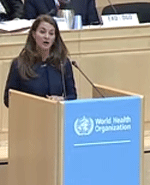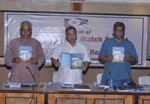Published on Thu, 2014-05-22 11:00
With two more sessions left to go, work at the United Nations on the Sustainable Development Goals (SDGs) faces continuing challenges. On Friday 9 May, the Co-Chairs of the Open Working Group (OWG) on Sustainable Development Goals (SDGs) produced a narrative ‘chapeau' of two pages that will accompany the framework of the goals, sent to all Member States. The 11th session of the OWG took place on 5-9 May at the UN headquarters in New York. The Co-Chairs are Ambassadors Macharia Kamau of Kenya and Csaba Korosi of Hungary. Since the OWG started holding intergovernmental discussions in March 2013, developing countries in the Group of 77 and China (G77) have consistently called for a narrative to accompany the SDG framework. |
Published on Mon, 2014-05-19 00:14
We the undersigned organizations express our strong protest against the decision of the World Health Organization (WHO) to invite Melinda Gates (of the Bill and Melinda Gates Foundation – BMGF) as the keynote speaker at the 67th World Health Assembly, that begun in Geneva on 19th May. This is the third time in the last 10 years that someone from the BMGF and of the family has been an invited speaker at the WHA (Melinda Gates was preceded by her husband Bill Gates, in 2005 and 2011). Ms. Melinda Gates’ credentials as a leader in public health are unclear. It is unacceptable that the WHO, supposedly governed by sovereign nation states, should countenance that at its annual global conference, the keynote address would be delivered thrice in ten years by individuals from the same private organization, and from the same family. |
Published on Thu, 2014-05-15 19:24
The National Social Watch Report and the Odisha Social Watch Report 2013 was launched on Tuesday 13th May 2014 in DRTC-CYSD, Bhubaneswar, India. Mr. Jagadananda, President of National Social Watch, presented both the reports, followed by the presentations of the findings of the reports and open discussions. Dowload the Citizens' Report on Governance and Development 2013 and Odisha Social Watch Report 2013. » |
Published on Thu, 2014-05-15 09:21
The participants in the civil society strategy meeting on monitoring and accountability organized by Social Watch last february in Montevideo were asked about how they personally work and relate with the huge task of making the powerful accountable. Here is what they said: |
Published on Wed, 2014-05-14 14:17
Social Watch El Salvador has been executing a project called “Awareness and advocacy as tools for the financial education of the Salvadoran population and demanding a fair legislative framework for financial products.” The project has the objective of contributing to the generation of public opinion on abuses perpetrated by financial institutions that have an impact on the population generating negative impacts on poverty and human rights conditions. |
SUSCRIBE TO OUR NEWSLETTER







